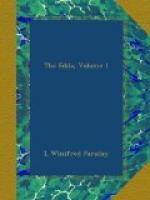The connexion of both with the Midsummer fires, originally part of an agricultural ritual, can hardly be doubted.
* * * * *
Loki, or Lopt, is a strange figure. He is admitted among the Aesir, though not one of them by birth, and his whole relation to them points to his being an older elemental God. He is in alliance with them against the giants; he and Odin have sworn blood-brothership, according to Lokasenna, and he helps Thor to recover his hammer that Asgard may be defended against the giants. On the other hand, while in present alliance with the Gods, he is chief agent in their future destruction, and this they know. In Snorri, he is a mischievous spirit of the fairy-tale kind, exercising his ingenuity alternately in getting the Gods into difficulties, and in getting them out again. So he betrays Idunn to the giants, and delivers her; he makes the bargain by which Freyja is promised to the giant-builders of Valhalla, and invents the trick by which they are cheated of their prize; by killing the otter he endangers his own head, Odin’s and Hoeni’s, and he obtains the gold which buys their atonement. Hence, in the systematising of the Viking religion, the responsibility for Baldr’s death also was transferred to him. At the coming of the fire-giants at Ragnaroek, he is to steer the ship in which Muspell’s sons sail (Voeluspa), further evidence of his identity as a fire-spirit. Like his son the Wolf, he is chained by the Gods; the episode is related in a prose-piece affixed to Lokasenna:
“After that Loki hid himself in Franangr’s Foss in the form of a salmon. There the Aesir caught him. He was bound with the guts of his son Nari, but his son Narfi was changed into a wolf. Skadi took a poisonous snake and fastened it up over Loki’s face, and the poison dropped down. Sigyn, Loki’s wife, sat there and held a cup under the poison. But when it was full she poured the poison away, and meanwhile poison dropped on Loki, and he struggled so hard that all the earth shook; those are called earthquakes now.”
Voeluspa inserts lines corresponding to this passage after the Baldr episode, and Snorri makes it a consequence of Loki’s share in that event.
He is more especially agent of the doom through his children: at Ragnaroek, Fenri the Wolf, bound long before by Tyr’s help, will be freed, and swallow the sun (Vafthrudnismal) and Odin (Vafthrudnismal and Voeluspa); and Joermungandr, the Giant-Snake, will rise from the sea where he lies curled round the world, to slay and be slain by Thor. The dragon’s writhing in the waves is one of the tokens to herald Ragnaroek, and his battle with Thor is the fiercest combat of that day. Only Voeluspa of our poems gives any account of it: “Then comes the glorious son of Hlodyn, Odin’s son goes to meet the serpent; Midgard’s guardian slays him in his rage, but scarcely can Earth’s son reel back nine feet from the dragon.”




